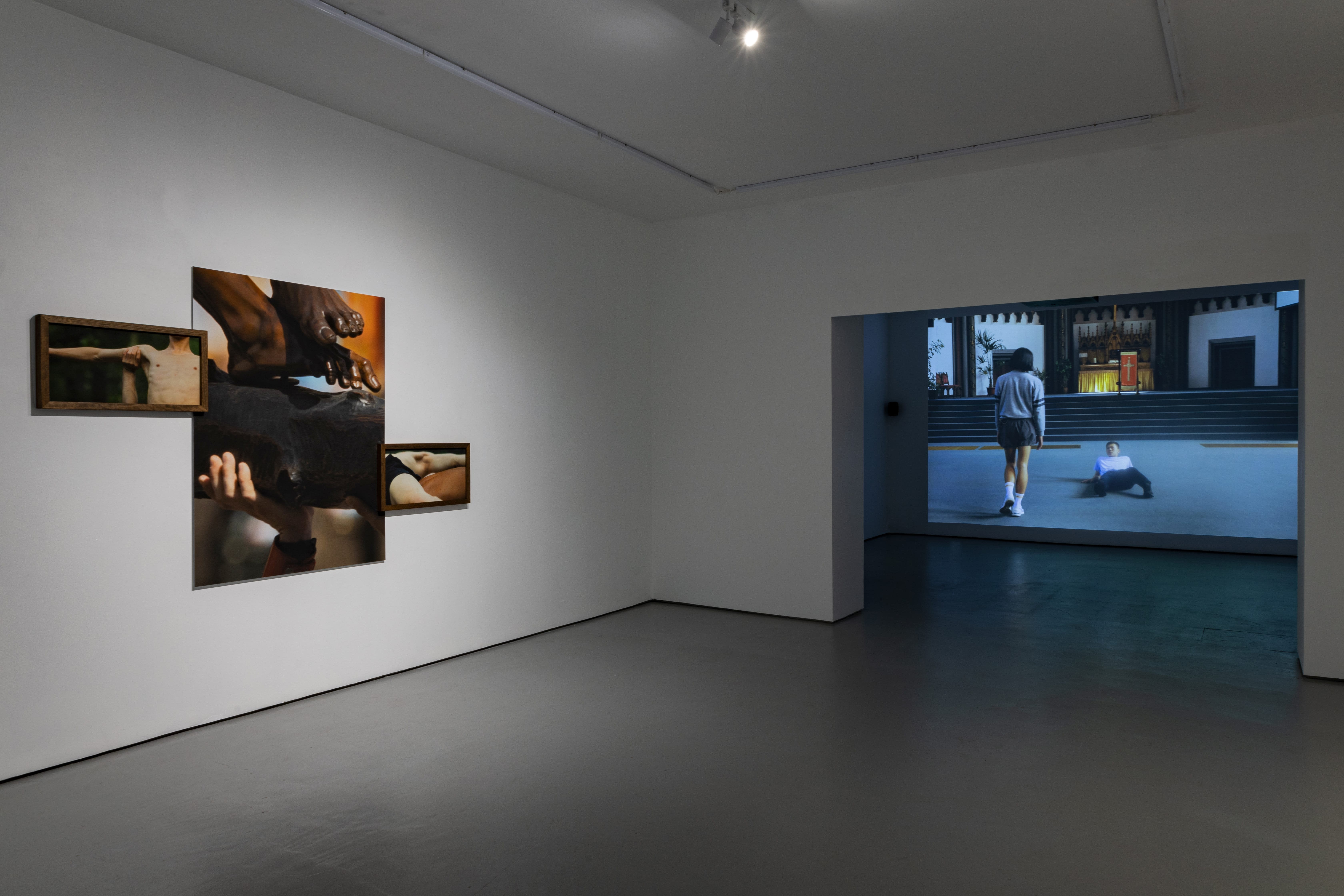
COMA is pleased to announce a solo exhibition by Berlin-based artist Young-jun Tak (b. 1989, South Korea) titled I need to switch myself, on view 1 – 30 March, 2024. This is the artist’s first solo presentation with COMA and taking place at our Darlinghurst location, First Floor 71-73 Stanley Street, Darlinghurst, NSW, 2010.
Through sculpture, film and performance, I need to switch myself, debuts Tak’s inaugural choreographic film Wish You a Lovely Sunday (2021) in Australia for the first time, and continues to traverse the artist’s exploration into the unusual channels of communication between radical Christian organizations and queer communities – pulling a thread between two dissimilar places of worship through movement and course.
I need to switch myself transforms the gallery into a space for devotion and worship, where we are encouraged to shift ourselves to become reverent before the act of sanctity. In a room for contemplation and consideration, Tak wrestles with the contradictory principals within himself, through breaking down the desire to polarize and categorize, kneeling to the obscurity within.
Two pairs of queer bodies move and wraith, elegantly distorting their limbs to the beat of their surrounding structures, a Church, Kirche am Südstern, and a queer club, SchwuZ, in Berlin. To produce this film, two choreographers and two dancers were paired to compose an original dance for a church and a queer club. Each pair was assigned a different Bach piano piece for four hands. After days of rehersals and when the performances were complete, their designated venues were swapped. Forced to reprogram their chereography on the day they arrived, each artist changed and adapted their movements to fit the mould of their new architectural surroundings. Tak utilises this experiment, the performers sensitive bodies and corporela movements, to spotlight the heteronormaty of architecture and place, emphaising how sexual minorities have had to adapt themselves in given structures.
Placed delicately on a waist high shelf is a small marble sculpture reminiscent of a holy water stoup, an object placed as a reminder of baptism in the Catholic Church. Inside the sculpture, titled, Wishful, Tak has crafted a hyper-realistic silicone rendition of his own nipple, appropriating a common Christian iconograph of the severed breast, popular in fables such as the breasts of Saint Agatha of Sicily, that were cut off by pincers and served on a plate. The patriarchal perspective could not avoid sexualization of the female body, despite the solemnity of religion.
Haptic visuality and manual fabrication are crucial components of Tak’s practice. Caught in between a moment, Tak continues to marry two opposing ideals in one frame in You see them from afar and They are like looking at you from afar. The still images from the artists previous film series, Love Your Clean Feet on Thursday (2023), have been arranged to form the sign of a cross. In two smaller lenticular prints, titled I need to switch myself (2024) and Space, body, body, space (2024), switch their appearance according to the viewers position, revealing a new image each time the viewer moves from side to side.
In redeploying religious iconography and queer culture together, Tak is able to surrender himself to particular codes and behavioral parameters in order to be welcomed into the spaces of performative worldmaking – churches and clubs, South Korea and Germany, binary and non-binary – that are central to his own and the collective expression of earthly belonging, a martyr to his own cause.
Growing up in South Korea, Tak was surrounded with nationalist mindsets, an innate desire to project one’s sense of belonging through collective self-promotion and patrioticism. Since relocating to Berlin, Tak has redirected this sentiment towards German culture. In the hand-carved sculpture Of All Seasons, a pair of white asparagus have been crafted by a 15th generation Bavarian wood carving family and then set in bronze, and cradled by a rusty metal ring, haloing the vegetables that resemble the shape of a Latin cross, the ultimate symbol for worship.
The asparagus have partly metamorphosed with young male heads sprouting, their gaze extending outwards in awe. The facial expressions suggest a longing for something, perhaps a miracle or affection, but the desire remains ambiguous, suspended between the communion of the miniature figures. White asparagus, or Spargel in German, was imported to Europe from Asia, the Middle East and Northern Africa, overtime becoming a beloved annually harvested vegetable, cropped traditionally until the 24th of June, coinciding the ancient North European summer solstice and the Feast Day of Saint John the Baptist.

